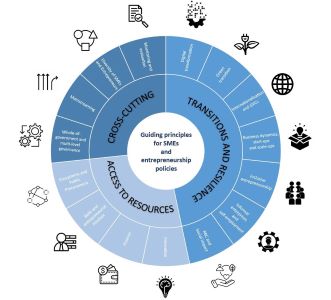SMEs and entrepreneurship
OECD SME and Entrepreneurship Strategy
The OECD Committee on SMEs and Entrepreneurship is developing principles for effective, efficient and coherent SME and entrepreneurship policies.
What's the issue?SMEs and entrepreneurs constitute the backbone of economies in OECD countries and beyond. They are front and centre to ensure strength and quality of the post-COVID19 recovery and that the pathway to grow is sustainable, cleaner and more inclusive. However, SMEs and entrepreneurs often face specific challenges in their growth and access to resources, and in adapting to major transitions. The policies to support them range from framework conditions, generic measures to support the business population to more targeted measures for SMEs and entrepreneurs. As such, often a wide number of Ministries and agencies across government at both central and subnational level are involved. This makes SME and entrepreneurship a complex domain to deliver effective, efficient and coherent policies. In 2019, the OECD set out on an ambitious journey to develop an SME and Entrepreneurship Strategy. Like other Strategies the OECD has developed, such as on innovation, skills and green growth, the OECD SME and Entrepreneurship Strategy aims to provide an evidence-based and holistic framework to support countries in developing coherent, effective and efficient SME and entrepreneurship policies. This ambition reflects the widely acknowledged importance of SMEs and entrepreneurs for inclusive and sustainable growth, and the need to ensure an effective cross-cutting policy approach towards SMEs and entrepreneurs in light of the many policies and government levels engaged. The COVID-19 pandemic, which strongly affected SMEs and entrepreneurs world-wide and triggered unprecedented government action, made the ambitions of the Strategy even more important and urgent.
What will the SME and Entrepreneurship Strategy deliver?As part of the OECD SME and Entrepreneurship Strategy, a set of guiding principles is being developed, which reflect key aspects of SME and entrepreneurship policies and can support policy makers:
|
This figure shows the topics the 15 principles will address. |
Principles related to policy coordination and governance: |
Principles related to transitions and resilience: |
Principles related to access to resources: |
|
1. Whole-of-government and multi-level governance 2. Cross-cutting approach 3. Diversity of SMEs and entrepreneurs 4. Monitoring and evaluation |
5. Digital transformation 6. Green transition 7. Internationalisation and participation in global value chains 8. Business dynamics, start-ups and innovative entrepreneurship 9. Fostering inclusive entrepreneurship 10. Transitions related to informal enterprises and self-employment 11. Enhancing responsible business conduct and social impact |
12. Innovation 13. Finance 14. Skills and entrepreneurial mindset 15. Ecosystems, networks and public procurement |
To display the text of each principles, hover your mouse over the principle title.
How can you participate?
The SME and Entrepreneurship Strategy is developed by the OECD Committee on SMEs and Entrepreneurship, in which OECD countries as well as various non-OECD countries and stakeholders are represented.
Discussions on aspects of the SME and Entrepreneurship Strategy regularly take place via webinars and other events. Register for the OECD Centre for Entrepreneurship, SMEs, Cities and Regions newsletter to stay informed on activities.
Publications
Contact
For further information, please contact Lucia Cusmano (Lucia.cusmano@oecd.org), Deputy Head of Division
Related Documents

